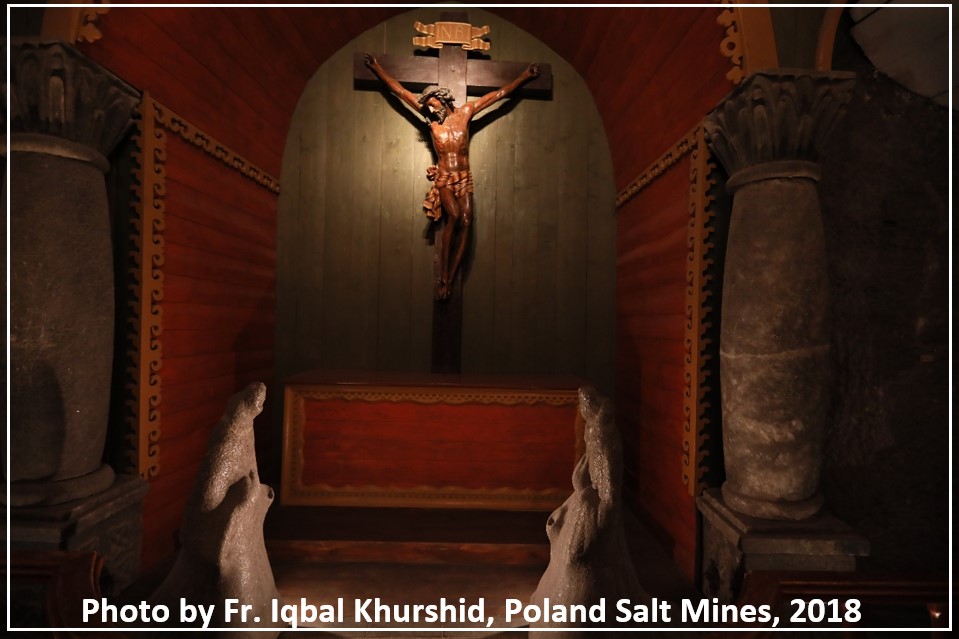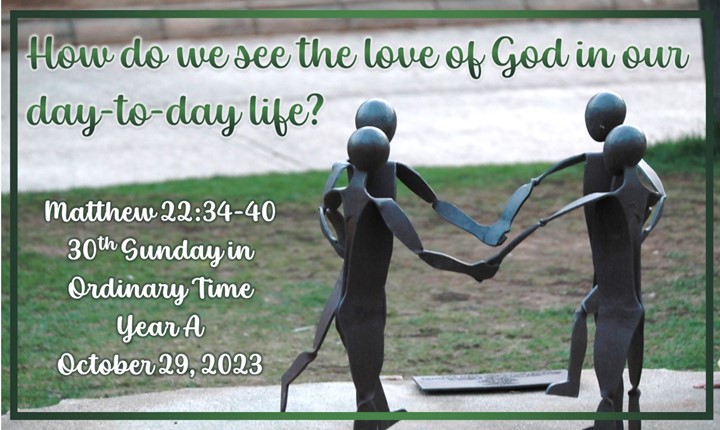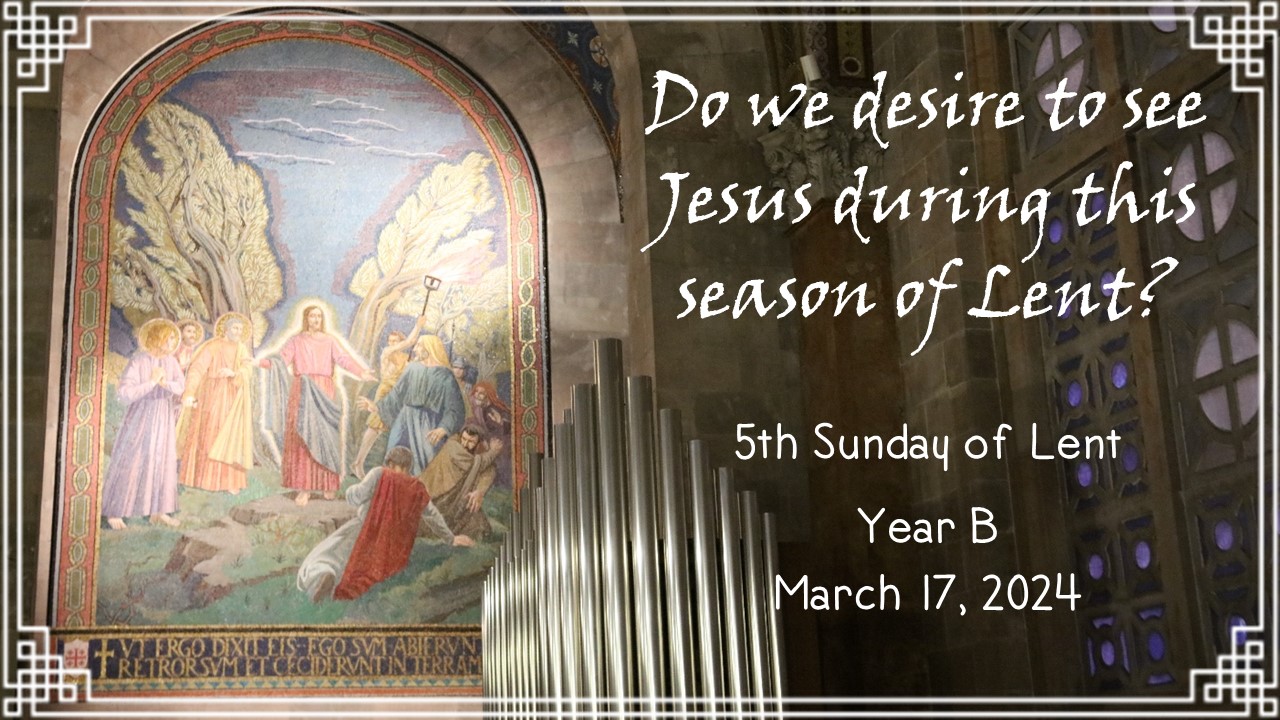
23rd Sunday in Ordinary Time Year C ~ September 4, 2022
NO PARTIALITY IN OUR DISCIPLESHIP
Every Sunday afternoon, after the morning service at their church, the Pastor and his 11-year-old son would go out into their town and hand out Gospel tracts. This particular Sunday afternoon, as it came time for the Pastor and his son to go to the streets with their tracts, it was very cold outside as well as pouring down rain. The boy bundled up in his warmest and driest clothes and said, “Okay Dad, I’m ready.” His Pastor Dad asked, “Ready for what? “Dad, it’s time we gather our tracts together and go out.” Dad responds, “Son, it’s very cold outside, and it’s pouring down rain.” The boy gives his Dad a surprised look, asking, “But Dad, aren’t people still going to Hell, even though it’s raining?” Dad answers, “Son, I am not going out in this weather.” Despondently the boy asks, “Dad, can I go? Please?” His father hesitated for a moment but said, “You can go. Here are the tracts; be careful, son.”” Thanks Dad!” And with that, he was off and out into the rain. This 11-year-old boy walked the streets of the town, going door-to-door and handing everybody he met in the street a Gospel tract. After hours of walking in the rain, he was soaking bone-chilled wet and down to his very last tract. He stopped on a corner and looked for someone to hand a tract to, but the streets were totally deserted. Then, he turned toward the first home he saw and started up the sidewalk to the front door and rang the doorbell. He rang the bell, but nobody answered. He rang it again and again, but still no one answered. He waited, but still no answer. Finally, this 11-year-old trooper turned to leave, but something stopped him. Again, he turned to the door and rang the bell and knocked loudly on the door with his fist. He waited, something holding him there on the front porch. He rang again, and this time the door slowly opened. Standing in the doorway was a very sad looking elderly lady. She softly asked, “What can I do for you, son?” With radiant eyes and a smile that lit up her world, this little boy said, “Ma’am, I’m sorry if I disturbed you, but I just want to tell you that JESUS REALLY DOES LOVE YOU! I came to give you my very last Gospel tract which will tell you all about Jesus and His great love.” With that, he handed her his last tract and turned to leave. She called to him as he departed, “Thank you, son! And God bless you! The following Sunday morning in church, Pastor Dad was in the pulpit and as the service began, he asked, “Does anybody have a testimony or want to say anything?” Slowly, in the back row of the church, an elderly lady stood to her feet. As she began to share the experience, she had with the young kid handing over the tract and how she was helped not to commit suicide. I truly believe that JESUS REALLY DOES LOVE ME.
What a heartwarming story to read and reflect on the value of our discipleship. God shows his love everyday through his Son’s passion and resurrection. There are four basics of discipleship which lead us to give ourselves complete to the Lord.
- We share the Word and speak about the Gospel as we live accordingly.
- We show the Word to the world and once we share it and people believe in Christ as their Saviour, we baptize them in the Holy Trinity to be one with Christ as he is one in God the Father and the Holy Spirit.
- We teach the Word of eternal life to other people making them to believe that is the true Word of God.
- We serve the Word as our ultimate goal of our lives because Word of God lives forever as St. Peter says (1 Peter 1) and it fulfills the purpose for it is being sent in the words of Prophet Isaiah (55).
As I said earlier there is no partiality in our discipleship and should not be because we need to remember the characteristics of our discipleship:
- Introducing others to Jesus. …
- Praying: our primary work. …
- Stewarding resources generously. …
- Knowing & Obeying God’s Word. …
- Completing the Great Commission. …
- Depending on the Holy Spirit’s empowering. …
- Taking Faith-Filled risks.
This is only possible through the wisdom of God as we see in the First Reading today. We are not sure how long we are going to live but one thing for sure we know is that the wisdom of God will lead us to eternal life. King Solomon is just reminding everyone that there is no one who could know the counsel of God or who can discern what the Lord wills? God helps us to discern our vocation as a disciple to understand that if we have given our lives to him, then we must give it completely without holding anything back. “Who can learn the counsel of God?” suggests that our life is a mystery and that we do not possess the key to understanding it. There are always two characters in history: God and man. Our task is to perceive the call of God and then to do his will. But in order to do his will, we must ask ourselves, “What is God’s will in my life?” We find the answer in the same passage of the Book of Wisdom: “People were taught what pleases you”. In order to ascertain the call of God, we must ask ourselves and understand what pleases God. On many occasions the prophets proclaimed what was pleasing to God. Their message found a wonderful synthesis in the words “I want mercy, not sacrifice” (Hos 6:6; Mt 9:13) and also please read Job 38-42 chapters to understand the will and power of God. God is pleased by every act of mercy, because in the brother or sister that we assist, we recognize the face of God which no one can see . Each time we bend down to the needs of our brothers and sisters, we give Jesus something to eat and drink; we clothe, we help, and we visit the Son of God (Mt 25:40). In a word, we touch the flesh of Christ. We are thus called to translate into concrete acts that which we invoke in prayer and profess in faith. There is no alternative to charity: those who put themselves at the service of others, even when they don’t know it, are those who love God. The Christian life, however, is not merely extending a hand in times of need. If it is just this, it can be, certainly, a lovely expression of human solidarity which offers immediate benefits, but it is sterile because it lacks roots. The task which the Lord gives us, on the contrary, is the vocation to charity in which each of Christ’s disciples puts his or her entire life at his service, so to grow each day in love.
At first glance Gospel reading looks very scary, how Jesus could ask us to hate our own families when he himself was part of our family. Does he really ask us to do so? I believe he is not, but he is reminding us that if we want to follow him, then there is a cost to it and there shouldn’t be partiality. We must give up everything for his sake to follow him. He paid a cost for us by shedding his blood on the cross for our salvation. Are we ready to take his challenge of giving up everything to follow him? Following Jesus is a serious task, and, at the same time, one filled with joy; it takes a certain daring and courage to recognize the divine Master in the poorest of the poor and those who are cast aside, and to give oneself in their service.
This is true to this Sunday’s readings. God has created us with love and showed this love by sending his only Begotten Son into the world to save us. At first glance the Gospel reading looks very scary, how Jesus could ask us to hate our own families when he himself was part of our family. Does he really asking us to do so? I believe he is not, but he is reminding us that if we want to follow him, then there is a cost to it and there shouldn’t be partiality. We must give up everything for his sake to follow him. He paid a cost for us by shedding his blood on the cross for our salvation. Are we ready to take his challenge of giving up everything to follow him?
Following Jesus does not mean taking part in a triumphal procession! It means sharing his merciful love, entering his great work of mercy for each and every man and for all people. The work of Jesus is, precisely, a work of mercy, a work of forgiveness and of love! Jesus is so full of mercy! And this universal pardon, this mercy, passes through the Cross. Jesus, however, does not want to do this work alone: he wants to involve us too in the mission that the Father entrusted to him. After the Resurrection he was to say to his disciples: “As the Father has sent me, even so I send you” … if you forgive the sins of any, they are forgiven” (Jn 20:21-22). Jesus’ disciple renounces all his possessions because in Jesus he has found the greatest Good in which every other good receives its full value and meaning: family ties, other relationships, work, cultural and economic goods and so forth…. The Christian detaches him or herself from all things and rediscovers all things in the logic of the Gospel, the logic of love and of service. To explain this requirement, Jesus uses two parables: that of the tower to be built and that of the king going to war. The latter says: “What king, going to encounter another king in war, will not sit down first and take counsel whether he is able with ten thousand to meet him who comes against him with twenty thousand? And if not, while the other is yet a great way off, he sends an embassy and asks terms of peace”. Jesus does not wish to address the topic of war here; it is only a parable. We must understand the value of our discipleship to serve the Lord otherwise we may fall in a trap like this scholar to become proud of ourselves.
There was once a great scholar. Everybody in the kingdom appreciated him because he was so learned. Unfortunately, in spite of his great learning he had great pride. One day this scholar put on a gold necklace and went to the palace of another king. He said, “Whoever can defeat me in wisdom will get this necklace. I challenge everybody!” All the scholars in that particular kingdom had heard about this scholar and they were afraid that they would lose. So they would not accept his challenge. The king was very sad that nobody would accept the challenge.
Finally, the court jester said, I accept your challenge.” The king had almost surrendered to the scholar but thought it would be amusing to see his jester compete. He believed he was only a joker and would not be able to win the necklace. The court jester said, “I will ask you four questions. if you answer any of my questions correctly, then you will lose, but if all your answers are incorrect, then I will accept defeat and the king will give you anything you want.”
Then the court jester asked his first question: “Where do you come from?” The scholar said, I live here.” This was incorrect, since he came from another kingdom. So, by giving the wrong answer the scholar passed the first test. The jester’s second question was, “How long have you been here?”
“Three years,” the scholar said, which was also incorrect. Still the court jester was unable to trick him. The third time the jester asked, “Our king is good, kind and generous. Do you agree?” The scholar said, “Your king? What you are saying is totally wrong. Your king is undivine and very unkind.” So again the scholar passed the test.
The court jester said, “It seems that I can’t defeat you. How many questions have I asked so far?” The scholar said, “You have asked me three questions; you have one more. If I do not answer it correctly you will lose. ”
The court jester cried out, “Look! The scholar has lost. He has answered this question correctly.” So the scholar gave his necklace to the court jester, and the jester immediately gave it to the king. The scholar’s pride was totally smashed. He said, “I will never come to your kingdom to challenge anybody again.” All the scholars were very impressed by the court jester’s cleverness. They knew that they would not have been able to defeat the great scholar. The jester said, “You see, when great scholars are not alert, they lose. Had he been alert, he could have saved himself.”
Are we alert to understand the cost of our discipleship to carry our Cross everyday? Let’s be grateful to God for our commitment to serve the Lord without any partiality so that we may acclaim “Lord we are unworthy servants, we only did what we ought to do”.
Other Sermons In This Series

30th Sunday in Ordinary Time – Year A ~ October 29, 2023
October 27, 2023

5th Sunday of Lent Year B ~ March 17, 2024
March 14, 2024

5th Sunday of Lent Year A ~ March 26, 2023
March 24, 2023

